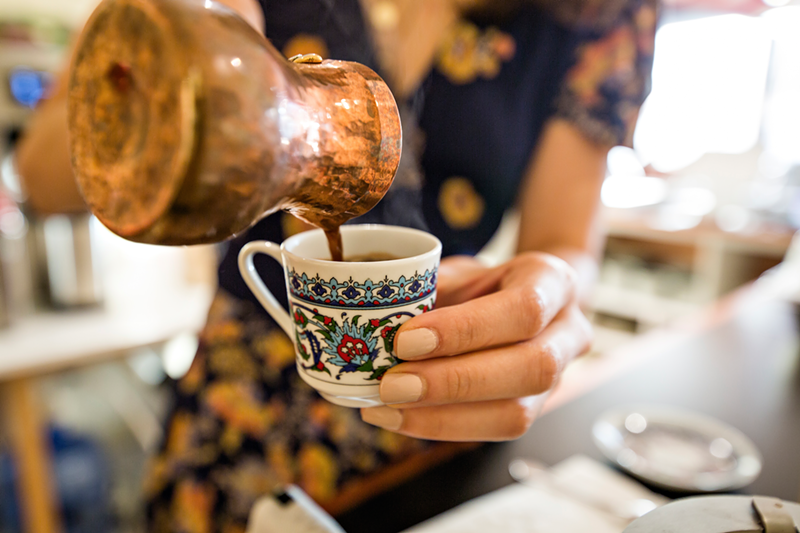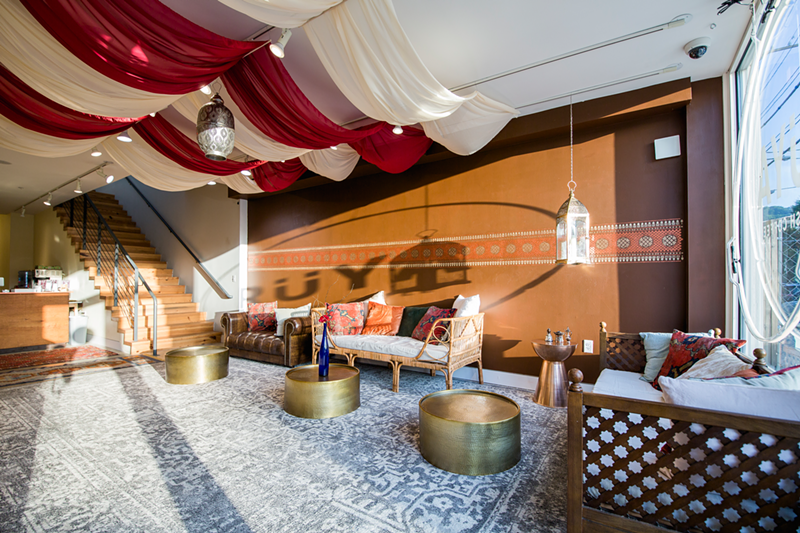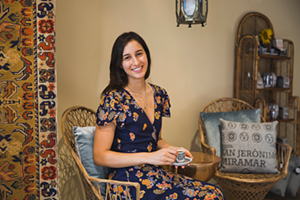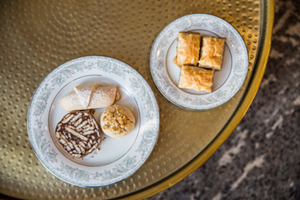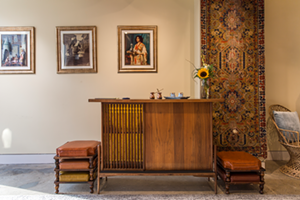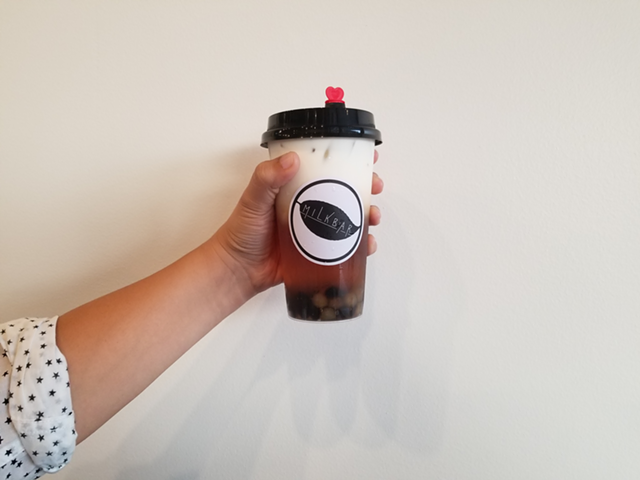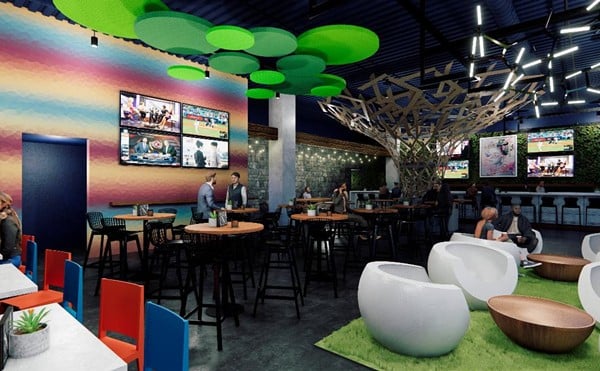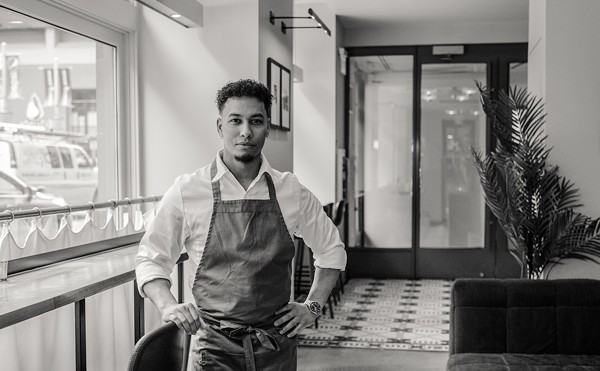Tucked away in a small corner of Findlay Market, three young women gather around a low table, sitting on floor cushions or kneeling. They’ve already finished their coffee. Two empty cups sit upside down on matching saucers, and the small group chats while waiting for the coffee grounds — which have settled at the bottom of their tiny cups — to run down the sides.
When the cups are flipped right-side up again, the patterns inside are to be read like a palm.
“When it’s clean, you have clear intentions. A pure heart,” one is told. Another learns that the thick lines in her cup indicate an uphill challenge. Examining the markings together leads to conversation on career paths, travels, book recommendations and break-ups. They only just met, but soon they’re laughing like old friends.
Interpreting the lines in the fine coffee grounds is Melissa Aydogan, the heart and soul of Rüya Coffee, her Turkish coffee pop-up at the market.
Aydogan is a 2018 recipient of a People’s Liberty Globe Grant: a $15,000 grant given to groups or individuals with a goal of turning People’s Liberty’s Findlay Market headquarters into a shared community space. The storefront has been everything from a ceramic workshop to microcinema. This time around, it’s been transformed into a traditional Turkish coffeehouse.
The interior is decorated in rich shades of reds and oranges accented by velvet pillows, layered rugs and billowy chiffon draped from the ceiling. Families, couples and friendly strangers find themselves nestled into cushioned benches or gathered around a big community table.
“I want you to feel like you’re sitting in my grandma’s living room,” Aydogan says.
A first-generation Turkish American and Cincinnati native (she works as an account executive at Procter & Gamble), Aydogan is using her grant project to share a piece of her family’s heritage.
“I saw an opportunity and I would’ve regretted if I didn’t take it and I would have regretted not giving my family the opportunity to bring a piece of their home back to the home that I grew up in,” she says.
As for the fortune telling? The practice is “more so to spark conversation about your future — your hopes; your dreams,” she says. “Hence, the name Rüya, which means ‘dream.’ ”
Dating back to the 16th century, Turkish coffee is the oldest brewing method of coffee in the world. In 2013 it was added to the UNESCO Representative List of the Intangible Cultural Heritage of Humanity.
“Back in the day,” as Aydogan says, the coffee was prepared in hot sand. It’s still done today for the pure novelty of it, but a hot stove will do the job just fine. Aside from a heat source, all you need is water and coffee that’s been ground to an ultra-fine powder. In this case, the coffee in question is a special blend created by local Deeper Roots Coffee specifically for Aydogan’s grant project.
Preparing a cup of Turkish coffee is simple enough, but getting it just right is a science and an art that Aydogan began to learn as soon as she was old enough to be trusted with a stove.
“It’s cooked in an ibrik, which is a copper pot with a long handle,” she says. “Basically, you start with cold water and then you put the grounds in and heat it together.”
The trick is getting the foam just right.
“The foam at the top is a very important part of Turkish coffee…as soon as the coffee starts bubbling up, (it’s) making sure that it gets to the very edge of the ibrik and then turning down the heat and then pouring it into the cup.”
The first sip is the absolute best one. The froth of foam on top — perfected by practice — is silky smooth. Turkish coffee is best enjoyed slowly. Not unlike espresso, it’s definitively dark and can be a bit bitter.
“If you’ve never had it, I can understand if you don’t like it — you will not hurt my feelings,” Aydogan says with a laugh. “It’s very strong.”
You can, of course, request to sweeten up your cup, but make sure to ask for sugar before the coffee is made. Instead of adding it last, the sugar is combined with the coffee grounds during brewing.
Those looking for a sweet treat on the side won’t be disappointed, either. Rüya offers a variety of baked goods like flaky baklava and a rich, chocolate mosaic cake.
Another feature on the menu? Traditional Syrian cookies baked by refugees living in Cincinnati. While America has chocolate chips, Syrian cookies use ingredients like pistachios and dates.
“A big part of the shop will be supporting Syrian refugees, which is something I’m passionate about,” Aydogan says.
When her own parents came to America, she says it was a “classic immigrant story: no plan, no money, no one to, you know, help them. And so I have to give back.”
For Aydogan, the goal of Rüya is simple: it’s all about fostering community. To understand Turkey’s coffee is to understand some of the values of Turkish culture. Aydogan recalls one of many Turkish sayings about coffee: “Once does not desire coffee or a coffeehouse. One desires conversation and coffee is just an excuse.”
“From kind of a cultural standpoint, I view it as a communication tool — not just within the Turkish culture but cross-culturally,” she says.
For herself and many others, sharing a cup of coffee is about making a connection more than it is caffeine.
“Once you prepare it in a certain way and present it to someone, it’s almost a feeling of ‘I’ve taken care of this person and they feel good and they feel valued.’ Sometimes I see coffee in America as a necessity. It’s like grab and go. Whereas Turkish coffee…we take our time,” she says.
Still having family in Turkey to visit (and share coffee with), Aydogan says she tries to make the trek over about once a year. This year, she went at the tail end of August, just weeks before Rüya was set to open.
“I made sure that I was reading (the newspaper) every day while I was on vacation. I saw Turkey was in the headlines every single day — like ‘Trump’s relationship with Erdogan is not good, Turkey doesn’t like America, America doesn’t like Turkey,’ blah blah blah,” she says. “And I remember getting a text message from my friend like, ‘Are you sure this a good time for you to open up a Turkish coffee shop?’ And I was like, no, I think this is the perfect time for something like this.”
Aydogan says that she’s aware some people may have an unconscious bias as to what they think Turkish people are like, but she hopes that she can challenge people to forgo assumptions. Rüya isn’t about politics — it’s about people.
“It really comes down to what the Turkish coffee culture is about, which is friendship and hospitality and the fact that, you know, we care about the person sitting across from us,” she says. “It just shows that the values of our culture are really about relationships.
“I want people to be able to come into this space regardless of what culture you are. America is referred to many times as the ‘melting pot,’ but I like to see it as a mosaic. Because I think people want to be celebrated for their individuality and their uniqueness. So I don’t want to put a bunch of cultures in a pot and dissolve it, but more celebrate and highlight those cultures.”
Rüya Coffe, 1805 Elm St., Over-the-Rhine, ruyacoffee.com; Hours: 10 a.m.-4 p.m. Friday and Sunday; 8 a.m.-4 p.m. Saturday.

